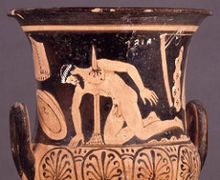Ajax (Sophocles)
| Ajax | |
|---|---|

The suicide of Ajax. Etrurian red-figured calyx-krater, ca. 400–350 BCE.
|
|
| Written by | Sophocles |
| Chorus | Sailors from Salamis |
| Characters |
Athena Odysseus Ajax Tecmessa Messenger Teucer Menelaus Agamemnon |
| Mute | Attendants Servants Soldiers Eurysaces |
| Place premiered | Athens |
| Original language | Ancient Greek |
| Genre | Tragedy |
Sophocles' Ajax, or Aias (/ˈeɪdʒæks/ or /ˈaɪ.əs/; Ancient Greek: Αἴας [a͜í.aːs], gen. Αἴαντος), is a Greek tragedy written in the 5th century BCE. Ajax may be the earliest of Sophocles' seven tragedies to have survived, though it is probable that he had been composing plays for a quarter of a century already when it was first staged. It appears to belong to the same period as his Antigone, which was probably performed in 442 or 441 BCE, when he was 55 years old. The play depicts the fate of the warrior Ajax, after the events of the Iliad but before the end of the Trojan War.
The great warrior, Achilles, has been killed in battle. The man who now can be considered the greatest warrior, Ajax, should be given Achilles’ armor, but the two kings, Agamemnon and Menelaos, award it instead to Odysseus. Ajax becomes furious about this and decides to kill them. However, Athena steps in and deludes Ajax into killing instead the spoil of the Greek army, which includes cattle as well as the herdsman. Suddenly Ajax comes to his senses and realizes what he has done. Overwhelmed by shame, he decides to commit suicide. His concubine, Tecmessa, pleads for him not to leave her and their child, Eurysakes, unprotected. Ajax then gives his son his shield, and leaves the house saying that he is going out to purify himself and to bury the sword given to him by Hector. Teucer, Ajax’s brother, arrives. Teucer has learned from the prophet, Kalchas, that Ajax should not be allowed to leave his tent until the end of the day or he will die. Tecmessa and soldiers then try to find Ajax, but they are too late. Ajax has impaled himself upon his sword. Before his suicide, Ajax calls for vengeance against the sons of Atreus (Menelaus and Agamemnon) and the whole Greek army. Tecmessa is the first one to discover Ajax’s body. Teucer then arrives and orders that Ajax’s son be brought to him so that he will be safe from foes. Menelaus appears and orders the body not to be moved.
...
Wikipedia
